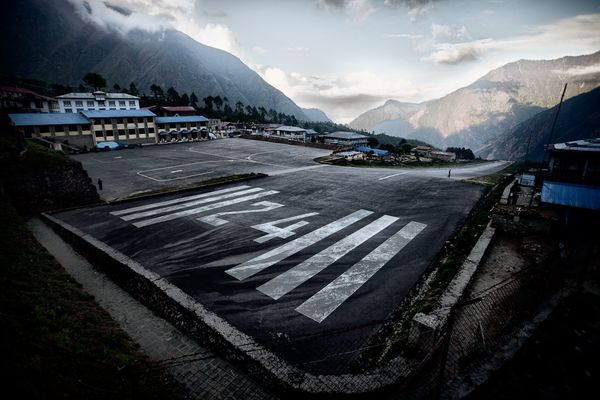A United Airlines Boeing 737 MAX recently experienced "stuck" rudder pedals shortly after landing, prompting the National Transportation Safety Board (NTSB) to investigate the incident.

The Incident
On February 6, a United Airlines 737 MAX 8 landed at Newark Liberty International Airport (EWR) carrying 161 passengers and crew. Shortly after arrival, the crew reported that the aircraft's rudder pedals became "stuck." Despite this, the plane was taxied to the gate without issue, and no injuries were reported onboard.
In its investigation, the NTSB) noted the Captain's report that the rudder pedals were not moving. Specifically, during the landing rollout, the phase after touchdown, the pedals did not move in response to pilots applying "normal" foot pressure while attempting to maintain the runway centerline. As recorded in the NTSB report, the Captain said that the pedals remained stuck in their neutral position and that the nose wheel steering tiller was used to keep the airplane near the runway centerline as it slowed to a safe speed before exiting the runway.
The tiller is a control mechanism separate from the rudder pedals and yoke. Usually, the tiller is located on the Captain's left-hand side and the First Officer's right-hand side. This mechanism is mainly used to steer the aircraft on the ground. Further in the report, the Captain asked the First Officer to check his rudder pedals, to which the First Officer reported the same problem.

However, shortly after, the Captain reported that the rudder pedals began operating normally. The 737 MAX 8 in question was taken out of service. Three days after the incident, United conducted a test flight with the aircraft and was able to reenact the reported rudder pedal malfunction. While conducting a post-incident inspection, no obvious malfunctions were found. After removing the rudder system components, a second test flight was conducted in which the rudder controls operated normally.
Boeing
Boeing said it has worked with United "to diagnose the rudder response issue" and was "successfully resolved with the replacement of three parts." The aircraft involved in the incident has since returned to service. According to Boeing, this instance was the only reported issue involving the 737 MAX. The aircraft's rudder pedal system is identical to MAX's predecessor generation, the 737NG.

There were two similar rudder pedal occurrences on 737NG aircraft in 2019. Boeing confirmed that it was aware of these instances and that the issues were resolved through "component replacements." This incident adds to the growing concerns involving Boeing and its 737 MAX. The aerospace manufacturer has been under constant scrutiny recently following the January 5 mid-air door plug blowout on an Alaska Airlines 737 MAX 9.
Last month, the Federal Aviation Administration (FAA) formally mandated inspections in 737 MAX jets for loose bolts in the rudder control systems after Boeing recommended this act in December. However, It should be noted that the 737 MAX is a safe aircraft to fly. This is especially true following an extensive grounding and reevaluation of its systems. However, issues related to loose bolts and rudders highlight concerns about Boeing's manufacturing process for new MAX jets.
Cliffs, Clouds, and Courage: Lukla Airport Nepal, The World's Most Dangerous Airport » This Delaware Firm is Saving FBOs Millions in Hangar Costs » Air France Announces Paris-Las Vegas Nonstop Service »
Comments (0)
Add Your Comment
SHARE
TAGS
NEWS NTSB Investigation Boeing United Airlines Boeing 737 MAX 737 MAX Newark Technical Government ControversyRECENTLY PUBLISHED
 Cliffs, Clouds, and Courage: Lukla Airport Nepal, The World's Most Dangerous Airport
Perched high in the Himalayas, Lukla Airport — officially known as Tenzing-Hilary Airport — is widely regarded as the world's most dangerous airport. Located in Nepal's Khumbu Pasanglhamu region near Mount Everest, it serves as a critical gateway for trekkers beginning their journey to the world's highest peak.
INFORMATIONAL
READ MORE »
Cliffs, Clouds, and Courage: Lukla Airport Nepal, The World's Most Dangerous Airport
Perched high in the Himalayas, Lukla Airport — officially known as Tenzing-Hilary Airport — is widely regarded as the world's most dangerous airport. Located in Nepal's Khumbu Pasanglhamu region near Mount Everest, it serves as a critical gateway for trekkers beginning their journey to the world's highest peak.
INFORMATIONAL
READ MORE »
 Boom Supersonic Says It Can Fly Faster Than Sound, Without a Sound
After the retirement of the Concorde in 2003, the regulations that grounded high-speed airlines over land, which were originally written in the 1970s, remained untouched. Boom Supersonic's upcoming airliner, Overture, aims to change that. Through a combination of modern aerodynamics and advanced computing, Boom believes the era of quiet supersonic flight over populated regions is closer than most might think.
STORIES
READ MORE »
Boom Supersonic Says It Can Fly Faster Than Sound, Without a Sound
After the retirement of the Concorde in 2003, the regulations that grounded high-speed airlines over land, which were originally written in the 1970s, remained untouched. Boom Supersonic's upcoming airliner, Overture, aims to change that. Through a combination of modern aerodynamics and advanced computing, Boom believes the era of quiet supersonic flight over populated regions is closer than most might think.
STORIES
READ MORE »
 Pakistan International Airlines Returns to Manchester after 5-Year Ban
After a hiatus of more than five years, Pakistan International Airlines (PIA) has resumed flights to the United Kingdom. The newly reinstated nonstop service between Islamabad (ISB) and Manchester (MAN) officially took off on October 25th.
ROUTES
READ MORE »
Pakistan International Airlines Returns to Manchester after 5-Year Ban
After a hiatus of more than five years, Pakistan International Airlines (PIA) has resumed flights to the United Kingdom. The newly reinstated nonstop service between Islamabad (ISB) and Manchester (MAN) officially took off on October 25th.
ROUTES
READ MORE »



